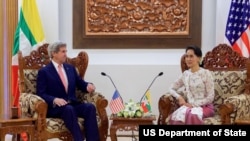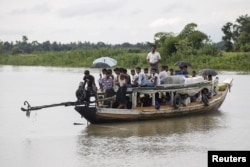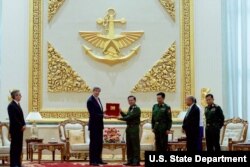U.S. Secretary of State John Kerry has hailed Myanmar's transition to democracy, but urged its new civilian led government to continue its work on implementing key reforms meant to improve developments and human rights.
"We strongly support the democratic transition that is taking place here," Kerry told reporters in a joint news conference with Aung San Suu Kyi, during his one-day visit to the capital Naypidaw. "The key to the lifting of the [remaining] sanctions is really the progress that is made within Myanmar in continuing to move down the road of democratization."
Kerry's visit came days after Washington lifted various financial and trade sanctions imposed on the country when it was under military rule. Bans on scores of other individuals and groups remain in place.
Aung San Suu Kyi, who serves as Myanmar's foreign minister and de facto leader since her political party won historic elections in March, says she welcomes the scrutiny that is inherent in the remaining sanctions.
"I'm not afraid of sanctions, we'll get over this and I'm sure that the time will come soon when the United States will know that this is no longer the time for sanctions," she told reporters.
'Rohingya' issue
Kerry and Aung San Suu Kyi also discussed Myanmar's recent request that the U.S. embassy stop using the term "Rohingya" when referring to the country's unrecognized ethnic minority, a major point of contention between the two countries.
When questioned on the issue, Aung San Suu Kyi called for space to deal with the debate over the issue.
"Emotive terms make it very difficult for us to find a peaceful and sensible resolution to our problems," she said. "All that we are asking is that people should be aware of the difficulties we are facing and to give us enough space to solve all our problems."
Kerry agreed that the issue was a sensitive matter.
Myanmar's government claims those calling themselves Rohingya are Bengalis who have illegally entered the country.
Myanmar, a predominately Buddhist country, has received international criticism for its treatment of the mainly Muslim minority, which is largely denied citizenship and many other basic human rights.
U.S. Ambassador Scot Marciel has said the U.S. would continue to use the term because it is Washington's policy to call communities what they want to be called.
Following his talks with Suu Kyi, Kerry met with Myanmar armed forces chief Min Aung Hlaing in the capital.
Some material for this report came from AP, AFP and Reuters.







